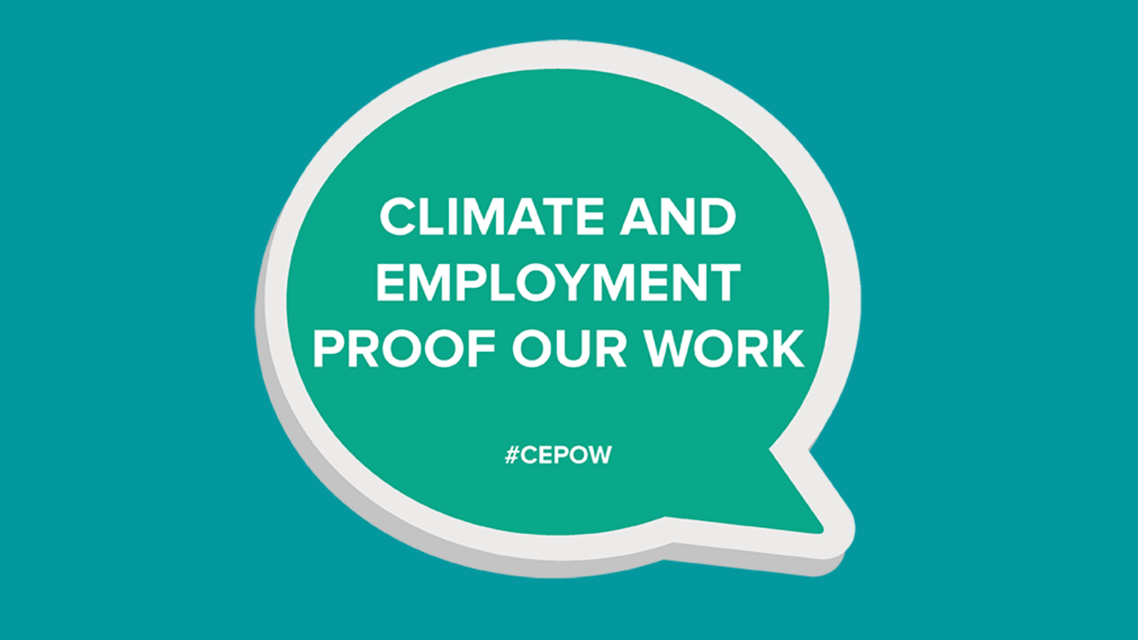We know that ‘there are no jobs on a dead planet’ and we also know that our industries provide many of the solutions needed to confront the climate emergency.
Around the world, unions are playing their part in the societal conversation about how we address the existential threat of climate change, in our workplaces and the way that we work.
Today, on 24 June, we’re joining the ITUC in the Global Day of Action to Climate and Employment Proof our Work. Joining a global conversation about delivering a sustainable and socially responsible recovery. A conversation which focuses on how our industrial workplaces can play their part in that recovery.
IndustriAll European Trade Union and our affiliates have been engaged in this conversation for decades, as we represent workers in some of the sectors which will potentially face the most dramatic transformations in the coming years. Manufacturing, mining and energy workers across Europe are committed to tackling climate change. We know that ‘there are no jobs on a dead planet’ and we also know that our industries provide many of the solutions needed to confront the climate emergency.
However, this conversation has changed in the last few months, as many industrial workers are facing imminent threats to their workplaces as a result of the COVID-19 pandemic. While many people have enjoyed the clean skies and improved air quality that societal lockdown has brought large parts of Europe, the impact of halting economic activity has had major ramifications for millions of European workers.
Already the scale of this crisis for our members across European manufacturing, mining and energy sectors has been staggering. Nearly half of Europe’s 2.5 million automotive workers have been furloughed. Aerospace workers are among the most affected by the pandemic shutdown, but the least prepared. Textile workers have been hit by the closure of retail shops. In the steel sector, the number of plant shutdowns has generated real concern that half of Europe’s steel making capacity could be lost by the end of the pandemic. Workers in the chemical industry are at the mercy of their key customers (e.g. automotive). Conversely, those working in the pharmaceutical industry face the societal demand and pressure of bringing production of strategic products back to Europe as quickly as possible. Moreover, the application of lockdown rules in the workplace across all industries will negatively impact productivity for many months to come. The pandemic has accelerated pre-existing structural changes in companies and sectors.
As the pandemic eases its grip on our physical health, the focus has shifted towards ensuring as strong an economic recovery as possible. At the centre of our demands for the recovery is the long-held trade union demand for a Just Transition to a carbon-neutral society. There can be no Just Transition without jobs. Europe’s industrial workers have been calling loudly for an ambitious European recovery plan based on solidarity, sustainability and investment. We are convinced that the recovery plan and the European Green Deal can be an opportunity for the European economy and its workers, provided it is based on an ambitious industrial strategy. It can reinforce Europe as a global leader in tackling climate change while protecting and promoting our social model.
Industrial workers now need a strong signal from the EU and its member states supporting proactive industrial strategies, active labour market policies for workers affected by the pandemic and the green transition, workplace rights to anticipate change to avoid mass redundancies, strengthening social dialogue and effective social protection.
A Just Transition is an existential demand for Europe’s industrial workers.
Contact: Andrea Husen-Bradley, press and communication

